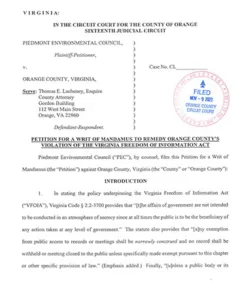Media Contact:
Don McCown, Field Representative
Piedmont Environmental Council
[email protected]; 540-347-2334, x7047
For Immediate Release:
Orange County, VA. (Nov. 10, 2023) – In the interest of good governance and transparency, The Piedmont Environmental Council filed a lawsuit yesterday against Orange County for improperly denying public access to documents pertaining to a local rezoning application, in violation of the Virginia Freedom of Information Act. The lawsuit comes after Orange County officials were unresponsive to PEC’s petition for a Writ of Mandamus, served on Oct. 26, which gave county officials a number of days to correct their VFOIA deficiencies. The lawsuit reflects PEC’s growing concern about the dramatic loss of public access to information about land use decisions in Orange County and across the Commonwealth.
“Virginia’s law acknowledges that the public has a right to know about future land uses — which are a significant determiner of quality of life in communities throughout the Commonwealth. If the Orange County Board of Supervisors is allowed to hide critical information on the largest rezoning in county history, using nondisclosure agreements to withhold even a description of the types of information being kept secret, it sets a precedent that will, in effect, allow governing decisions to be conducted behind a veil of secrecy, undermining the democratic process for generations to come,” said PEC President Chris Miller.
In April, the Orange County Board of Supervisors approved an application to rezone more than 2,500 acres of land in the Germanna-Wilderness Area of Orange County. Prior to that approval, County officials barred the public from access to nondisclosure agreements and other related records, ignoring VFOIA requirements. According to PEC’s lawsuit, Orange County’s refusal to provide the requested documentation constitutes a flagrant disregard of the letter and spirit of Virginia Code § 2.2-3700, which provides that “[t]he affairs of government are not intended to be conducted in an atmosphere of secrecy since at all times the public is to be the beneficiary of any action taken at any level of government.” The statute also provides that “[a]ny exemption from public access to records or meetings shall be narrowly construed and no record shall be withheld or meeting closed to the public unless specifically made exempt pursuant to this chapter or other specific provision of law.”
The lawsuit asks that Orange County be required to produce the nondisclosure agreements and identify any additional documents withheld per Virginia Code § 2.2-3705.6(3) or on the basis of privilege. An open hearing on the matter is expected to be scheduled within one week.
Background
At over 2,500 acres, Wilderness Crossing represents the largest rezoning in Orange County history and is projected to add as many as 60,000 vehicle trips per day, up to 5,000 residences, hundreds of acres of commercial development, and as much as 750+ acres of industrial development that is likely to include millions of square feet of energy-intensive data centers. Water for all of these unspecified uses would be drawn from the area’s only drinking water supply, the Rapidan River, which is already subject to withdrawal limits.
The potential development at Wilderness Crossing would involve erection of structures dwarfing the natural landscape, some likely rising 80 or more feet, on largely unimproved land within or overlooking two historically significant areas, the Wilderness and Chancellorsville battlefields, and lands eligible as part of the Congressionally-designated battlefield study area. The large area of land is also the site of several abandoned, contaminated gold mines, which pose a public health risk if disturbed.
Because of concerns about the project and desire to learn more details, PEC in September 2022 made a VFOIA request to Orange County for records pertaining to the Wilderness Crossing rezoning application. In its initial responses, Orange County redacted sender and recipient names and random words in emails without explanation, disregarding Virginia Code § 2.2-3704, which requires that a VFOIA response withholding any part of a requested record “identify with reasonable particularity the subject matter of withheld portions, and cite, as to each category of withheld records, the specific code section that authorizes the withholding of the records.”
In subsequent responses, the county asserted attorney-client privilege and exemption of proprietary information as justification for continued redactions. Similarly, Orange County refused to provide nondisclosure agreements, even redacted ones, signed by numerous county officials.
Broader Implications
“We’re seeing an alarming pattern all across the state of Virginia of local governments making decisions behind closed doors, particularly to fast-track data center proposals, which come with massive infrastructure consequences that affect local residents and ratepayers and with irreversible environmental impacts that affect all Virginians,” Miller said.
“Decisions that public officials make have consequences for the public; this is particularly true for land use decisions, which have the potential to transform the future of a community. Therefore, the public has a right to know how these decisions are being made. That’s a core tenant of representative government. You have to have a specific reason for what you withhold. By hiding behind NDAs and asserting they don’t need to provide much of anything, Orange County is replacing representative government and the democratic process with NDAs.”
#####
The Piedmont Environmental Council (PEC) works to protect and restore the lands and waters of the Virginia Piedmont, while building stronger, more sustainable communities. Founded in 1972, PEC is a locally based, community-supported 501(c)3 nonprofit and accredited land trust. At the core of PEC’s approach is a focus on educating, engaging and empowering people to effect positive change in their communities.

